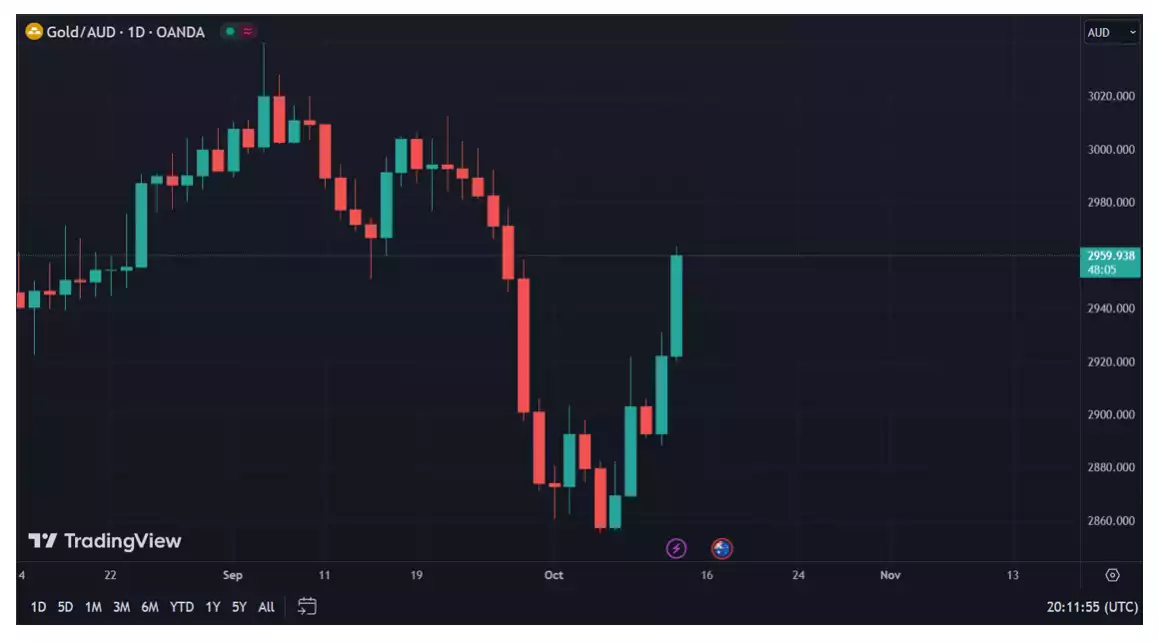Why is Gold Rocketing?
News
|
Posted 13/10/2023
|
2797
Gold has been marching higher, up over $100 in just a week, but what is the major cause? One of them might be scary signals from the treasury market.

The CPI inflation report has just been released from the US. Prices rose 3.7% y/y compared to 3.6% expected with shelter and energy being the biggest issues. As investors become fatigued at monitoring carefully sifted CPI data and balancing it with wishy-washy statements from Fed speakers, investors have been seeing major warning signs elsewhere.
In recent months, the rapid surge in US 10-year yields, climbing from 4.0% to 4.70% since early August, has sent shockwaves through the financial markets. This unexpected trend has occurred despite stable market-measured inflation and Federal Reserve expectations. Notably, there haven't been any significant economic surprises to justify these movements. Let's break down the factors contributing to this:
Lack of Foreign Investors and Sovereign Demand
One possible explanation for the rising yields is the reduction in foreign buyers, particularly China, in the treasury market. While China's holdings aren't rapidly decreasing, the lack of growth suggests a slowdown. If China and other countries reduce their purchases, the demand for US bonds decreases, leading to higher yields.
Higher Interest Rates Persisting
The resilience of US economic data (if believed), including robust jobs reports and spending figures, indicates that the US might withstand higher interest rates. This scenario could mark a shift to a new rate regime, possibly ranging from 3-6%, compared to the post-financial crisis range of 0-3%. However, this change could create challenges for other economies, which would make the USD keep getting stronger and pose a huge risk for US stocks.
Potential for Volatile Inflation
Market inflation pricing remains low, but the bond market might be signalling a future of higher (or more volatile) inflation. Wage resets and strikes hint at increased worker bargaining power, potentially contributing to inflation. The bond market's concerns might also be linked to commodity-led inflation or inflation resulting from de-globalization.
The Challenge of Debt
The era of easy money, characterized by negligible sovereign rates, might be ending. Rising yields could complicate sovereign deficits, impacting financing. The US may not be ready to respond to this situation with aggressive tactics, such as austerity measures meanwhile workers are already striking.
QT and Central Bank Actions
The massive balance sheets of central banks, a result of extensive bond buying, might have masked the actual cost of government borrowing. If it turns out that winding down these portfolios is necessary, it could create further market uncertainty. Other central banks, including Japan, have engaged in significant quantitative easing, intensifying the concern.
Their Combined Force
When all these factors are considered collectively, there's a fear that the global economy, built on deficits, quantitative easing, ultra-low rates, and speculative market activities, is facing a significant downturn. This scenario, akin to the bursting of a historic bubble, carries dire economic, market, fiscal, and political consequences, leaving investors with few safe havens.
Navigating the Turbulent Waters
Given these concerns, investors are left wondering where to seek safety for their capital. Traditional safe havens like bonds are less appealing due to rising yields (and actually being the debt instruments behind this Ponzi scheme). Cash could be one option, but what about those of us not using USD? Also, that leaves investors to call when monetary policy will pivot. Precious metals like gold and silver could be the winners, benefiting from reserve accumulation and market uncertainty. They have already been rising aggressively in the face of major economic announcements. Additionally, hard assets might prove resilient in a world experiencing currency devaluation, despite the bleak demand outlook.